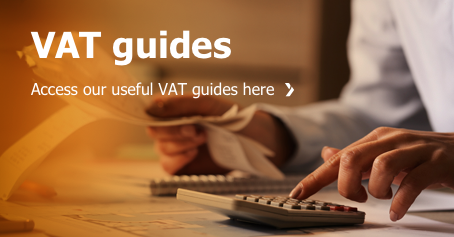Cyprus VAT Guide

Ioanna Theodoulou
Cyprus VAT specialist
This guide is an overview of Cyprus’ Value Added Tax (VAT) system.
For advice as to how your business is affected and about the specifics of your scenario please contact Ioanna Theodoulou from KRESTON ITH.
- What is the tax called?
- What is the tax authority?
- What type of tax is it?
- What is it due on?
- What are the VAT rates?
- What does a VAT number look like?
- Is there a registration limit?
- Registration with the Cypriot VAT Authorities
- When is the place of supply in Cyprus?
- Supply of Services
- Supply of Services
- VIES (VAT Information Exchange System)
- Intrastat
- Distance Selling
- Holding of Investments
- Triangular Trade
- How often do VAT returns need to be submitted?
- Are penalties imposed for late registration?
- Are penalties imposed in other circumstances?
- Fiscal Representative
- VAT recovery (non-residents)
- Claim on Pre-VAT registrations costs
- Can VAT be deducted?
- Do I need to issue an invoice?
What is the tax called?
VAT – Value Added Tax
What is the tax authority?
Ministry of Finance – Tax Department
What type of tax is it?
Consumption based tax on consumers, on business transactions and imports
What is it due on?
Taxable turnover – Imposed on the supply of goods and services within Cyprus, on the acquisition of goods from the European Union and on the importation of goods from third countries into Cyprus
What are the VAT rates?
Taxable:
19% – default (standard) rate
9% – reduced rate
5% – reduced rate
0% – zero rate
Exempt activities
9% reduced rate for example:
All restaurant and catering services.
Accommodation in hotels, tourist lodgements and any other similar lodgements.
Transportation of passengers.
5% reduced rate for example:
- The supply of pharmaceutical products and vaccines that are used for health care or prevention of illnesses.
- Books, papers and magazines.
- Fees for entry at sports events.
- Entry fees to theatres, festivals, museums etc.
- The supply of foodstuff.
- Renovation and repair of private households after 3 years of first residence, excluding the value of materials which constitute more than 50% of the value of the services.
- Hairdressing services.
- Construction or sale of private households (the purchaser should purchase a private household for the first time).
0% – zero rate for example:
• The exportation of goods.
• Supply, modification, repair, maintenance, chartering and hiring of sea going vessels and aircrafts, which are used to gain profit.
• Provision of services to meet the direct needs of sea going vessels and aircrafts.
Exempt from VAT for example
- Sale of shares
- Provision of Loans that charging interest
- Insurance services.
- Most hospital, medical and dental care services.
- Management services provided to mutual funds.
- Certain cultural educational and sport activities
What does a VAT number look like?
What does a VAT
number look like
123456789 X
Is there a registration limit?
For CY established businesses – in excess of €15.600 during the 12 preceding months
Registration with the Cypriot VAT Authorities
Compulsory when a legal or natural person:
- Has a taxable turnover from the supply of goods or services in Cyprus more than €15.600 during the 12 preceding months.
- Receives goods in Cyprus from other E.U. Member States of a total value higher than €10.251,61.
- Is expected to have a taxable turnover more than €15.600 from the supply of goods or services in Cyprus within the next 30 days following registration.
- Receives services from abroad, either from EU countries or from countries outside the EU more than €15.600. In such a case the Reverse Charge principle should be applied.
- Provides services to taxable persons established in another EU Member State for business purposes, in which the recipient is required to account for VAT under the Reverse Charge Principle. (VIES Obligation arises).
- Voluntary registration even if taxable turnover falls below the registration threshold. For Residents only.
When is the place of supply in Cyprus?
A supply that takes place in Cyprus.
- Basic Rule: If the goods are not physically moved between countries, the
place of supply is where the goods are made available or delivered to the
customer. Example: A Cyprus Company purchases goods from Italy where they remain. In this respect the place of supply of the goods is in Italy. - The place of supply of intra community trade is where the transportation ends (a valid VAT Registration number is necessary).
Example: A Cyprus company sell goods to a customer established in another EU Member State (possessing a Valid EU VAT no), the goods are physically moved from Cyprus to EU, and thus the place of supply for intra community sale of goods is where the EU VAT Registered person belongs to.The place of supply of goods transferred to third countries is Cyprus and the VAT rate applied is the Zero VAT Rate.The place of supply of goods follows the movement of the goods and not that of the invoice.
Supply of Services
Two General rules:
1. Business to Business Supplies (B2B)
When the recipient of the service is a relevant taxable person, the default place of supply is there where the recipient belongs to. The service must be offered for business purposes and not exclusively for private purposes.
2. Business to Consumer Supplies (B2C)
When the recipient is not a relevant taxable person. The recipient does not exercise any economic activity and receives the services exclusively for private purposes. Cyprus participates in the One-Stop-Shop OSS pan-EU VAT return for distance selling, introduced in July 2021.
Supply of Services
This principle applies when a company receives services from abroad from any person situated either within the EU or outside the EU. The principle also applies when there is acquisition of goods in Cyprus for business purposes from an EU supplier who is a taxable person. By applying the principle, the recipient acts as if it is both the supplier and the customer, it imposes VAT on the services received itself and then, assuming that the services relate to VAT taxable supplies that the recipient supplies, it can claim it back as input VAT with zero balance.
However, in the event that the recipient also offers exempt services, then it cannot claim it in full but in proportion to the taxable/ exempt services offered during the
particular VAT period.
VIES (VAT Information Exchange System)
If a person is registered for VAT purposes in Cyprus and provides certain services to VAT registered persons established in other Member State/s, has an obligation to submit VIES statement. There is no reporting threshold.
The submission is due on the 15th of every month; to declare information about the previous month.
Intrastat
Intrastat monthly reporting by the 10th of the following month for supply of goods above threshold: dispatches: €75k; arrivals: €270k.
Distance Selling
Distance Selling arises when a supplier in one EU Member state, supplies goods and is responsible for their delivery to any person in another EU Member state who is not registered with the VAT.
VAT on such a distance sale in Cyprus is subject to VAT in that other EU Member State up to the annual threshold of Cyprus which is €35.000.
However, when the value of distance sales in Cyprus exceeds the threshold of €35.000, then the supplier becomes liable to get registered with the VAT Authorities in Cyprus, thus VAT on any further sales is taxed in Cyprus
Holding of Investments
Purely Holding Companies are not considered to be exercising an economic activity due to the fact that their only source of income is dividends thus they do not have the right or the obligation to register for VAT.
Contrary to the above, the status of a non-economic activity may change, if the holding company is proved to have a direct or indirect involvement in the manage-ment of the companies that holds shares to.
Additionally, if a holding company in addition to holding of investments is also involved in other activities the non-economic status is no longer valid.
Triangular Trade
Triangular Trade is a mechanism which is used for VAT purposes to simplify transactions carried out between three entities within EU countries. In this situation there are three entities involved and the goods are directly delivered from the first entity to the third entity instead of transferring them from the first entity to the second and then to the third.
- Triangular Trade when the following conditions are satisfied:
- The trader must be registered for VAT purposes in Cyprus.
- The Seller must be registered with the VAT authorities in any EU Member state.
- The Second buyer should be registered for VAT purposes in the country where the goods are delivered.
How often do VAT returns need to be submitted?
Quarterly within 40 days after the end of the reporting quarter.
Filing method: Electronic via the Platform Tax For All (TFA). The new platform has been introduced in March 2023. Previously returns were submitted via Taxisnet.
Are penalties imposed for late registration?
Yes – €85 per month of delay
Are penalties imposed in other circumstances?
Yes – penalties and interest:
- Late payment of VAT: 10% on VAT due plus 1.75% interest on unpaid VAT
- Late submission of return: €100 for each return
- Late de-registration: €85 one-off
- Late submission of VIES return: €50 for each return
- Penalty for omission to keep books and records for a period of 6 years: €341
- Omission to submit the VIES return constitutes a criminal offence with a
maximum penalty of €850 - Fines for incorrect use of the reverse charge; up to €4.000, missing invoices €85
Fiscal Representative
A resident VAT Representative is required for non-EU businesses wishing to VAT register.
VAT recovery (non-residents)
EU businesses may apply for Cypriot VAT reclaims through the electronic portal of the tax authorities of their company residency.
Non-EU businesses must submit a paper reclaim with supporting invoices via theCypriot authorities directly.
Claim on Pre-VAT registrations costs
Permitted where directly relate to the provision of the taxable supply for 6 months on services prior to registration.
Can VAT be deducted?
VAT incurred on expenditure can be reclaimed where it is used in connection with ‘taxable’ sales, being at the standard, reduced or zero VAT rates.
VAT on expenditure used in connection with exempt supplies cannot usually be reclaimed.
Do I need to issue an invoice?
Invoice/s should be issued within 30 days of tax point (supply). Intra-community supply invoices should be issued by the 15th of the following month. Same applies for reverse charge invoices.

